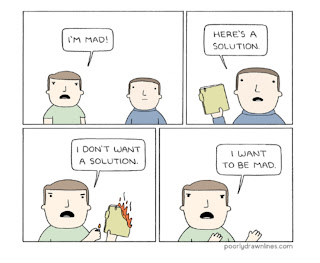A sher is but a meme
Two sides of the same coin- fundamental similarities between yesteryear's sher and today's memes
A sher (couplet) is an Urdu poem of 2 lines. In these two lines, the poet sets the context and presents his narrative. Its a complete poem in itself. The closest parallel of a sher in English poetry is a couplet.
I have always loved Sher-o-Shayari from very early on in life. Part of my fascination with this is because I think a sher is like a beautiful template that we can use to express our sentiments or present our POV in a conversation. It has a literary flavor and is a play on language, and emotions and often also has words of wisdom. It's a great tool for self-expression if you can quote them on the right occasions and as Somerset Maugham would say-
" The ability to quote is a serviceable substitute for wit"
Normally in most languages, we have poems on a particular topic which is expressed in many lines. A sher on the other hand is like a poem in every respect except that it must have a certain musicality or a rhythm and should be expressed in only two lines.
I often wonder what has made them so popular? Maybe a ‘sher’ in the past was what Twitter is nowadays, to our generation- a tool for brevity, to restrict expression to a certain number of words.
A poet, instead of expressing his thoughts in a multitude of lines like in a poem, is forced to express himself in just 2 lines. This shortness of length and musicality makes it easier for people to remember, quote and pass on to the next generation.
These days we have viral memes on the internet to depict a situation. People share these memes on social media giving their narratives. Some popular ones for example are :
I think a sher is like a meme made of words instead of an image. People quote it to present their views in a situation. Like a meme, it can morph and mutate to fit into all sorts of situations. It depends on the creativity and imagination of the user to juxtapose them in their context
Here is an example of a sher that can be used in multiple situations
Zindagi se yahi gila hai mujhe
Tu bahot der se mila hai mujhe
I have only one complaint about life
That I met you very late in life
One obvious usage is to express your love to the beloved. But there are multiple situations and multiple beings to whom you can quote this sher:
- May be to your employer ( if you’re nearing an appraisal 😀)
- Iphone (if u happen to love Siri)
- ChatGPT ( if you’re turned on by AI)
Subah ke dard ko, raaton ki jalan ko bhule
Kiske ghar jaye ki us wada shikan ko bhule
(wada shikan-one who breaks the promise)
How can I get rid of that pain of the morning and the burnt of the night
Where do I go or what should I do to forget that promise-breaker
In this sher it seems like the poet has been dumped in love and is now restless since he can't get rid of the memories.
In my case, I would use this to describe my feelings for food every time I go on a diet and can't help thinking about food 😀
Now that we have digressed to memories, here is one of my favorite quotes on memory from Gabriel Garcia Marquez
"Remembering is easy for anyone who has memory, forgetting is difficult for anyone who has a heart"
Finally, to wrap up, I have no smart conclusions for this post. Just a banal advice-keep reading, keep meme-ing and keep discovering life through poetry and all 📚




Comments